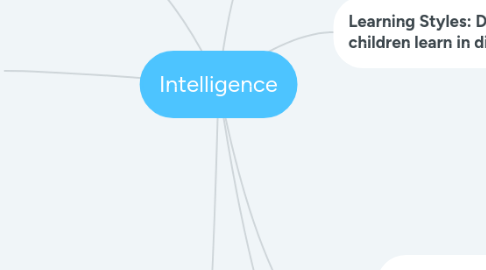Intelligence
作者:Taylor Gutoske


1. Wechsler's Global Capacity View
1.1. The global capacity of the individual to act purposefully, think rationally, and deal effectively with the environment.
2. Sternberg's Triarchic View
2.1. Practical Ability: Application of knowledge to everyday situations
2.2. Creative Ability: Creating, innovating, imagining
2.3. Analytical ability: Breaking down different situations, evaluating.
3. Howard Gardner- Multi-trait view of intelligence
3.1. Kinesthetic
3.2. Interpersonal
3.3. Naturalist
3.4. Spatial
3.5. Musical
3.6. Linguistic
3.7. Intrapersonal
3.8. Mathematical
3.9. Logical
3.10. Bodily
4. Street Smart vs Book Smart: A generality towards people who have more intelligence in one area over another.
4.1. Street Smart: Having more knowledge to deal with potential difficulties and dangers
4.2. Book Smart: Having more knowledge with different subject matters taught in school
5. Alfred Binet: The creator of the IQ test.
5.1. Negatives: Allows for stereotyping and may not always be 100% accurate.
5.2. Positives: Allows teachers to gain a perspective of the knowledge their students have
6. Learning Styles: Different children learn in different ways
6.1. Mental self-government styles
6.1.1. Functions, forms, levels, scope, and learning
6.2. Field dependence vs field independence
6.3. Reflectivity vs impulsivity
6.3.1. Impulsivity: making decisions very fast without much thought
6.3.2. Reflectivity: Making decisions after putting a lot of thorough thought into it.
